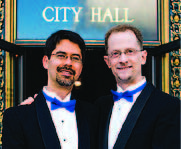 Last Sunday, our family had a wonderful dinner in the East Bay to celebrate Stuart’s mom’s 92nd birthday. On the way home from dinner, the three of us went to a small, quiet shopping center where I bought Stuart’s mom a new pill box at a drug store, while the two of them shopped at the grocery store. Buying the pillbox was fairly uneventful, although a somewhat mentally challenged man, who may also have been on drugs, harassed some of the other customers, telling them they were rich and they should give him money.
Last Sunday, our family had a wonderful dinner in the East Bay to celebrate Stuart’s mom’s 92nd birthday. On the way home from dinner, the three of us went to a small, quiet shopping center where I bought Stuart’s mom a new pill box at a drug store, while the two of them shopped at the grocery store. Buying the pillbox was fairly uneventful, although a somewhat mentally challenged man, who may also have been on drugs, harassed some of the other customers, telling them they were rich and they should give him money.
As I left the drug store I passed the man, who told me I, too, was rich and should give him money. I walked on by, choosing not to engage with him. Seconds later, I heard him yell out at me, “Faggot!”
I just kept on walking and joined Stuart and his mom at the grocery store. The man didn’t follow me and said nothing else to me. His remark had little immediate impact on me. I wondered if the man used the term “faggot” to some degree as a generic insult. I was neither dressed nor acting particularly “gay” or “not gay” that evening (just as I appeared neither rich nor not rich). The man was clearly disturbed and in need.
Nevertheless, I told Stuart on our way home from his mom’s place that if felt bizarre being called a “faggot” out of the blue while doing the eminently mundane act of walking in a quiet shopping center with a pillbox in hand—indeed, especially while I was doing such an ordinary thing. I’ve been fortunate that I have relatively infrequently been called “faggot” or otherwise harassed or faced verbal insults as an LGBT person, although on occasion I have experienced significant threats.
Several years ago, I was leafleting and talking to students about marriage equality on the quad of a college campus when a large and intimidating student became enraged and called me a “f-ing faggot” more times than I could count. He stalked the two of us who were leafleting to the point that we called the police as he was screaming “f-ing faggot” at me with his tightly clenched fist inches away from my chin. We also feared he had a gun. The police arrested him, and I pressed criminal charges against him in court. That incident upset me greatly.
Nothing resembling that happened in last week’s incident, but the experience of being called a “faggot” out of the blue stayed with me. I must admit that I have wondered whether I was giving off a “gay vibe” even doing such an innocuous thing as carrying a pillbox. But the fact that being called a “faggot” was the last thing I expected or was thinking about that night struck me most. It reminded me that LGBT people still today, even in the Bay Area, never know when they could face insults, either subtle or not so subtle. Some people feel a generalized license to make anti-gay insults as they wish.
Although I could brush off the incident as an adult today, hearing people verbally abuse others who appeared LGBT when I was growing up was really damaging to me then. It greatly contributed to my denying who I was to myself in an effort to ensure that no one would say that about me, although sometimes they still did. It made coming out seem very risky and unattractive. And, of course, it silenced my ability to speak up for others and myself. Such insults, threats, and name-calling continue to seriously harm many LGBT youth today. Even casual name calling can be triggering or traumatizing for LGBT adults who have previously experienced substantial physical, verbal or emotional abuse.
As a white cisgender-appearing male, the mundaneness of the circumstances of my being verbally gay bashed last Sunday night is an important reminder of how some LGBT people, women, people of color, and others experience this type of insult or scrutiny in myriad forms on a daily basis, simply living their lives as who they are.
We are all in this together, and we must continue to tell our stories of what it feels like to be who we are. There’s nothing like getting a glimpse of what it feels like to walk in another’s shoes.
John Lewis and his husband, Stuart Gaffney, were plaintiffs in the California case for equal marriage rights decided by the California Supreme Court in 2008. Their leadership in the nationwide grassroots organization Marriage Equality USA contributed to making same-sex marriage legal nationwide.
Recent Comments